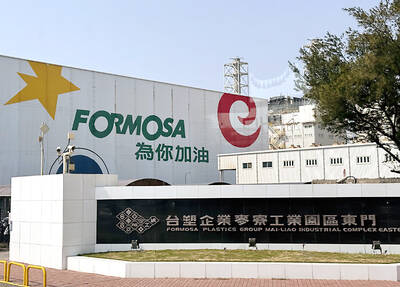Taiwan Semiconductor Manufacturing Co (TSMC, 台積電), the world’s top chipmaker on a contract basis, yesterday asked employees to take unpaid leave to help the company cut costs and combat the industrial slump driven by the deepening economic slowdown.
The new cost-cutting measures by the Hsinchu-based chipmaker came as economic turbulence is expected to last several months and could cut into most semiconductor companies’ revenues after driving factory utilization lower.
“Although our performance was very good in the first three quarters of the year, it began to decline rapidly in the fourth quarter,” company chief executive Rick Tsai (蔡力行) said in a video address to employees broadcast online yesterday.
FIVE DAYS
“It looks as if this period of economic weakness will last for a fairly long time, and business will become more difficult,” Tsai said. “The company must do its utmost to lower costs. At the same time, we will also do all we can to protect employees’ jobs.”
Employees at manufacturing departments have been asked to take five unpaid furloughs a month beginning this month on the back of falling factory utilization.
Starting next month, staff in all other departments will be asked to take one unpaid leave a week.
TSMC has been forced to take more stringent cost-control measures as it lowered its fourth-quarter outlook in response to shrinking demand.
FORECAST CUTS
On Monday, it slashed more than 8 percent from its revenue forecast for this quarter and cut its gross margin forecast by 4 percentage points.
More than one month ago, TSMC said it was considering slashing 20 percent from its capital spending for next year from US$1.8 billion this year.
To help employees reduce the effect of their lower monthly pay because of the reduction in working days, TSMC planned to allocate a portion of it’s profit-sharing distribution to help make up the shortfall in regular monthly income, Tsai said.

EXTRATERRITORIAL REACH: China extended its legal jurisdiction to ban some dual-use goods of Chinese origin from being sold to the US, even by third countries Beijing has set out to extend its domestic laws across international borders with a ban on selling some goods to the US that applies to companies both inside and outside China. The new export control rules are China’s first attempt to replicate the extraterritorial reach of US and European sanctions by covering Chinese products or goods with Chinese parts in them. In an announcement this week, China declared it is banning the sale of dual-use items to the US military and also the export to the US of materials such as gallium and germanium. Companies and people overseas would be subject to

Taiwan Semiconductor Manufacturing Co (TSMC, 台積電) founder Morris Chang (張忠謀) yesterday said that Intel Corp would find itself in the same predicament as it did four years ago if its board does not come up with a core business strategy. Chang made the remarks in response to reporters’ questions about the ailing US chipmaker, once an archrival of TSMC, during a news conference in Taipei for the launch of the second volume of his autobiography. Intel unexpectedly announced the immediate retirement of former chief executive officer Pat Gelsinger last week, ending his nearly four-year tenure and ending his attempts to revive the

WORLD DOMINATION: TSMC’s lead over second-placed Samsung has grown as the latter faces increased Chinese competition and the end of clients’ product life cycles Taiwan Semiconductor Manufacturing Co (TSMC, 台積電) retained the No. 1 title in the global pure-play wafer foundry business in the third quarter of this year, seeing its market share growing to 64.9 percent to leave South Korea’s Samsung Electronics Co, the No. 2 supplier, further behind, Taipei-based TrendForce Corp (集邦科技) said in a report. TSMC posted US$23.53 billion in sales in the July-September period, up 13.0 percent from a quarter earlier, which boosted its market share to 64.9 percent, up from 62.3 percent in the second quarter, the report issued on Monday last week showed. TSMC benefited from the debut of flagship

TENSE TIMES: Formosa Plastics sees uncertainty surrounding the incoming Trump administration in the US, geopolitical tensions and China’s faltering economy Formosa Plastics Group (台塑集團), Taiwan’s largest industrial conglomerate, yesterday posted overall revenue of NT$118.61 billion (US$3.66 billion) for last month, marking a 7.2 percent rise from October, but a 2.5 percent fall from one year earlier. The group has mixed views about its business outlook for the current quarter and beyond, as uncertainty builds over the US power transition and geopolitical tensions. Formosa Plastics Corp (台灣塑膠), a vertically integrated supplier of plastic resins and petrochemicals, reported a monthly uptick of 15.3 percent in its revenue to NT$18.15 billion, as Typhoon Kong-rey postponed partial shipments slated for October and last month, it said. The